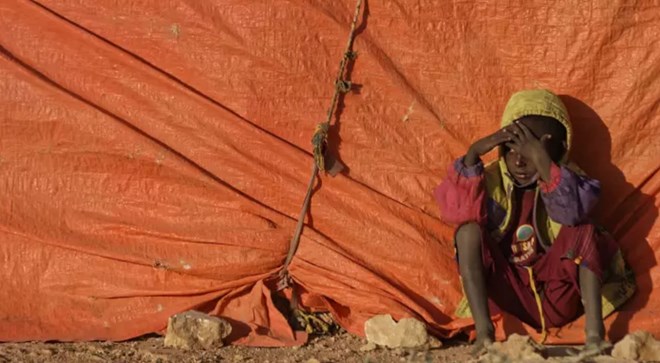
Friday March 10, 2017
by: John Aglionby
Response needs to be better co-ordinated and funded more rapidly, says Save the Children

A Somali boy sits outside a makeshift hut at a camp for people displaced by droughtf in Somalia © AP
The international community’s response to the threat of famine in Somalia is repeating some of the mistakes of the last such crisis six years ago, the aid agency Save the Children has warned.
Kevin Watkins, chief executive of Save the Children UK, said on Thursday after visiting Somalia’s Puntland region for three days that the response needed to be better co-ordinated and funded more rapidly to prevent hundreds of thousands of deaths.
“I just haven’t seen the level of detailed planning that I would expect to see in a crisis of this order of magnitude especially in light of what happened six years ago,” he told the Financial Times. “There have been pledges of $450m but no one has any idea where this money is coming from, where it’s going to be delivered, when it’s going to be delivered and how.”
In 2011-12, 260,00 people died in Somalia after the international community ignored more than a dozen famine warnings. As of Thursday evening, the UN said its Somalia appeal had received only $100.6m of the $865.3m requested three weeks ago.
Mr Watkins said the death toll was already in the hundreds, with many of the fatalities being young children who had suffered from acute watery diarrhoea or cholera.
The UN has warned that 6.2m people are at risk of famine in Somalia, with several million more facing the same fate in South Sudan, Yemen and parts of north-eastern Nigeria. Last month it declared a famine in parts of South Sudan after the country’s three-year-old civil war prevented aid agencies reaching those in need.
Mr Watkins’ warning contrasts with a more positive outlook given by António Guterres, the UN secretary-general, in Nairobi on Wednesday after he visited Somalia on Tuesday.
Mr Guterres acknowledged that the risk of famine was increasing and that the funding given to date was “very limited”. But he added: “There is now in place a mechanism of co-ordination between the central and the regional governments with the limited capacities they have but also with the international humanitarian system — both the UN agencies, NGOs and the Red Cross and Red Crescent Movement.
“My belief is that the system in place, if properly funded, will be able to respond, I wouldn’t say to solve all problems, but to respond quite substantially to the risks that exist.”
Mr Watkins rejected this. “I don’t think this response is the joined-up, co-ordinated plan it needs to be,” he said.
He added that it was not just the UN that was to blame. “We all need to learn the lessons from last time around when the world moved too slowly.”
Mike Noyes, the head of humanitarian response at ActionAid, a UK aid agency, said: “[In 2011] children starved to death in front of their mothers while the international community hesitated. That cannot be allowed to happen again. If we are to save lives the world must act before it is too late.”